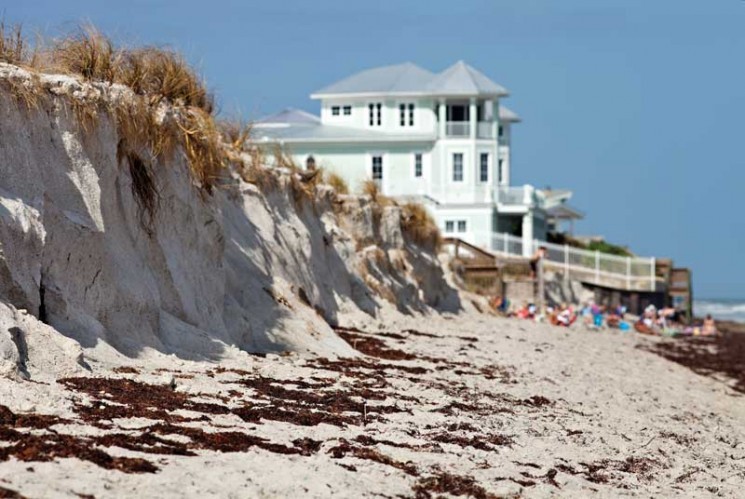INDIAN RIVER COUNTY — The summer and fall storms did not cause as much erosion damage to island beaches as it first appeared and nature is already starting to bring some sand back, according to the Indian River County coastal engineer and public works director.
That good news came as County Commissioners OK’d the resumption the first of the year of the final part of a beach renourishment program that has cost millions of dollars more than planned.
Once again this winter, hundreds of trucks a day will make their way over the Wabasso Bridge and onto the beaches where load after load of sand – 110,000 cubic yards of it – will be distributed as engineers attempt to replenish the shoreline on the northern end of the island.
The sand will be placed on the 1.2 mile stretch between Seaview to just south of Treasure Shores.
The area will act as a feeder beach and over time, officials hope, that sand will eventually wash up in the Disney area and fill in what nature took away over the summer.
Treasures Shores Park will likely be closed to the public while the work is being done and Golden Sands will also experience some closures though to a lesser extent, said Chris Mora, the Indian River County public works director.
The work is expected to take about two months once it gets under way.
This phase is expected to be the last part of the costly project which over the years has been hit hard by increasing costs.
The project has also been hampered because of regulations and difficulties in getting suitable sand from upland mines.
After the sand is distributed, engineers and scientists will monitor the area for the next three years to make sure the overall project does not have a negative impact on the natural reefs, turtles and other wildlife.
Mora admits the controversial and exceedingly expensive project has taken a long time to complete.
The so-called Sector 3 project encompassed 6.6 miles of beach from Seaview south to John’s Island and the cost of that now stands at $15.1 million.
The county has budgeted $13.1 million. The original bid to bring in upland sand as opposed to dredging sand off-shore came in at $7.2 million for Ranger Construction.
Ranger’s bill is now over $10.5 million. Added onto the $15.1 million tab is $1.6 million for potential mitigation costs should the work have a negative impact on the environment.
Regardless, if that money will need to be doled out, Mora said the money generated from the tourist tax and one cent sales tax over the course of the next year should help pay for any short fall.
“We don’t see a problem getting it,” said Mora.
Come March when the trucks and workers are expected to finish the work, it could be the last time in the foreseeable future that enormous amounts of sand will be dumped on the beaches.
“The end is in sight,” said Mora of the roughly $2 million project that is expected to finalize Sector 3. “This has to be the last phase. This is the last phase approved by the Board of County Commissioners.”
Mora addressed the county commissioners last week when they approved extending a 2005 contract for coastal engineering services. The original contract was renewed in 2008 and was set to expire next month.
The beach replenishment project has come under fire over the years because of excessive costs and delays.
“Some people see this as fruitless,” Mora said.
It was easy to view it that way during the summer when erosion of sand created a cliff along the beach that at some points was 10 feet high near the Vero Beach Disney Resort.
The relentless pounding of the shore by Hurricane Irene and the October no-name storm also pulled away a steady chunk of the dunes that were created to protect coastal properties.
But some of the sand lost to those storms is already starting to be replaced by nature, said James Gray, county coastal engineer.
“This doesn’t look too bad,” said Gray one day last week when he was surveying the beach just south of the Disney resort. “From what I can see, in the last couple of weeks we’ve had some recovery of sand.”
That’s good news, according to Mora and Gray, but still between 10 to 15 feet of dunes – dunes that had been created by beach renourishment projects – are gone.
The last phase of the project will not involve rebuilding of dunes.

